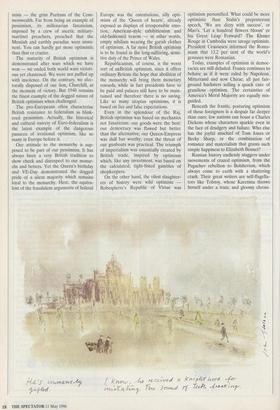IT'S MATURE OPTIMISM, NOT PESSIMISM
Simon Sebag Montefiore replies to Simon Blow
who, in last week's issue, complained that the British always complain
THE BRITISH have always believed that bumptious optimism should be punished. When I was little, my parents were visited by a pair of double-glazing salesmen, a Mr Wheatley and a Mr Cotton. They brought a small, framed square of double-glazing to show us how thick it was. My mother wished to confirm that children would not be able to fall through the glass. Mr Wheatley, an earnest middle-aged man, was wildly optimistic about the properties of his glass.
`It's so strong no kid could fall through that!' he said.
`It doesn't look very strong to me,' said my mother. `I could hit it and my hand would not go through it,' said Mr Wheatley, 'and I'm not being optimistic!'
Optimism made my mother wary. `All right then, I'll show you,' said Mr Wheatley. He took a step back, raised his fist and thrust it towards the glass. I closed my eyes. When I opened them, the glass was shattered and Mr Wheatley was bleeding profusely on the carpet. We had to take him downstairs to my father's surgery for stitches. As Mr Wheatley bled, Mr Cotton said: `The trouble is, Mr Wheatley doesn't know his own strength.'
Mr Wheatley was punished for his opti- mism. But I write to praise individual opti- mism and to denounce the optimism of nations. We are constantly told that all Britain's ills today stem from our national pessimism. On the contrary, our lack of ostentatious optimism is our national genius and the foundation of our stability.
We British are too mature a people to indulge in the naive optimism that has led other nations to slaughter. Simon Blow (`Let's look on the dark side', 4 May) clear- ly does not realise that excessive optimism is sensibly cloaked beneath gallows humour, diffidence and the pretence of an absence of promiscuous emotion. More buoyancy than optimism, this raises the spare but sturdy emotions of the British people above most others. Our enthusiasm ebbs and flows like a tide.
Our triumphs have always been greeted with a qualified pleasure and our disasters faced with a qualified disappointment. The few instances of irrational optimism, such as the South Sea Bubble or the preposter- ous cult of blue-eyed soldier-boy heroism in the autumn of 1914, have soon been cor- rected by reality. But actually, whenever it appeared that all was lost, a triumph was just ahead: Britain's pessimism after the loss of America in 1783 was greater than it is today. But the second, more glorious empire of the Raj was coming.
Thanks to our sang-froid, we have only once fallen into the hands of idiotic opti- mists — the grim Puritans of the Com- monwealth. Far from being an example of pessimism, its millenarian fanaticism, imposed by a crew of ascetic military- martinet preachers, preached that the Messiah and earthly paradise were immi- nent. You can hardly get more optimistic than that or crazier.
The maturity of British optimism is demonstrated after wars which we have won — we ended both world wars victori- ous yet chastened. We were not puffed up with insolence. On the contrary, we elec- torally disposed of our lion, Churchill, at the moment of victory. But 1940 remains the finest example of the dogged nature of British optimism when challenged.
The pro-Europeans often characterise British resistance to federalism as blink- ered pessimism. Actually, the historical and cultural naivety of Euro-federalism is the latest example of the dangerous panacea of irrational optimism, like so many in Europe before it.
Our attitude to the monarchy is sup- posed to be part of our pessimism. It has always been a very British tradition to show cheek and disrespect to our monar- chs and betters. Yet the Queen's birthday and VE-Day demonstrated the dogged pride of a silent majority which remains loyal to the monarchy. Here, the equiva- lent of the fraudulent arguments of federal Europe was the ostentatious, silly opti- mism of the 'Queen of hearts', already exposed as displays of irresponsible emo- tion, American-style exhibitionism and old-fashioned venom — in other words, empty nihilism wearing the garish clothes of optimism. A far more British optimism is to be found in the long-suffering, sensi- tive duty of the Prince of Wales.
Republicanism, of course, is the worst sort of unBritish optimism, since it offers ordinary Britons the hope that abolition of the monarchy will bring them monetary rewards, while in fact presidents have to be paid and palaces still have to be main- tained and therefore there is no saving. Like so many utopian optimisms, it is based on lies and false expectations.
Even in the splendour of the Raj, British optimism was based on mechanics not fanaticism: our goods were the best; our democracy was flawed but better than the alternative; our Queen-Empress was dull but worthy; even the threat of our gunboats was practical. The triumph of imperialism was essentially created by British trade, inspired by optimism which, like any investment, was based on the calculated, tight-fisted gambles of shopkeepers.
On the other hand, the vilest slaughter- ers of history were wild optimists — Robespierre's Republic of Virtue was optimism personified. What could be more optimistic than Stalin's preposterous speech, 'We are dizzy with success', or Mao's, 'Let a hundred flowers bloom' or his Great Leap Forward? The Khmer Rouge in Cambodia were savage optimists. President Ceausescu informed the Roma- nians that 13.2 per cent of the world's geniuses were Romanian.
Today, examples of optimism in democ- racies are still deluded. France continues to behave as if it were ruled by Napoleon. Mitterrand and now Chirac; all just fair- ground hucksters selling a quack cure of grandiose optimism. The certainties of America's Moral Majority are equally mis- guided.
Beneath the frantic, posturing optimism of these foreigners is a despair far deeper than ours: few nations can boast a Charles Dickens whose characters sparkle even in the face of drudgery and failure. Who else has the joyful mischief of Tom Jones or Becky Sharp, or the combination of romance and materialism that grants such simple happiness to Elizabeth Bennet?
Russian history endlessly staggers under movements of crazed optimism, from the Pugachev rebellion to Bolshevism, which always come to earth with a shattering crash. Their great writers are self-flagella- tors like Tolstoy, whose Karenina throws herself under a train, and gloomy chroni- clers of tragedy like Dostoevsky, who devotes half his Brothers Karamazov to a proposal to turn Russia into a vast punitive monastery. Solzhenitsyn's indictments of Stalinism only lead to his depressing and intolerant demands for a xenophobic Greater Russia. Pasternak's Zhivago is a selfish, self-obsessed, self-appointed poet destroying those around him for the sake of romance. Only Bulgakov and Babel inject irony and humour into their ghastly, colourful pictures of Bolshevik Russia.
One hardly needs to point out the dark- ness of German culture. But the best of French literature is also essentially black: the heroes of Balzac are heartless, nasty adventurers. Dumas' Monte Cristo is a hero consumed by vengeance. Zola's nov- els are really assaults on the embarrassing- ly vulgar and deluded folly of the French Second Empire. Proust's A La Recherche is as funny as Dickens, but so tragically pes- simistic that it ends with everyone we have come to love exposed as fraudulent inverts. And the obsession of American writers like Mailer or Capote with decayed icons, including Marilyn and JFK, are all about the bitter disappointment of the empty optimism of the American Dream.
All these cultures are tinged with disap- pointed and deluded optimism. The British way is Henry Vs 'little touch of Harry in the night' before Agincourt, Scott's stoicism in the face of disaster in Antarctica and Churchill's gritty defiance in 1940. We Britons possess the irrepress- ible cynicism and diffident satire of a nation that is truly sure of its emotions. We do not need to display them. The British are more like Virgil's Romans: `Others are sculptors or describe the movement of the stars. But your arts are to put down the proud and spare the con- quered.'
We never hide our ebbs and flows from ourselves. We are an island race. We understand the tides.




































































 Previous page
Previous page